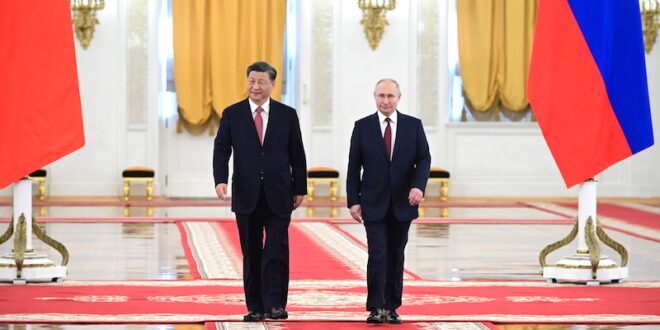The plane crash that killed mercenary leader Yevgeny Prigorzin and several others, in the eyes of The Economist, on August 23 this year may have repercussions beyond Russia as the dead mercenary leader had dared to challenge the Russian military establishment and had even sent his troops into Russia itself.
Analysts have pointed fingers towards Putin, who could not be physically present at the BRICS summit held recently in South Africa as the International Court of Justice has issued an arrest warrant accusing him of being responsible for war crimes in Ukraine. Putin committed the “war crime” of overseeing the unlawful abduction and deportation of children from Ukraine to Russia. Inside Russia, however, Putin is acclaimed for his “revenge” against Prigorzin for his defiance of the military establishment and of Putin himself. Prigorzin’s death, therefore according to Putin’s supporters, was well deserved and Putin became a hero who would not tolerate any defiance of his order, more so when the military establishment was carrying out his instructions. Others suggest that Putin has no friends, and some analysts would describe Russia as a vassal state of China.
But then China itself is in decline having reached its peak in growth. High levels of unemployment among young people could be a powder keg. Making matters worse, time is not on China’s side, as a shrinking and aging population will be an additional drag on economic growth and productivity. Chinese leaders tend to resist policy change, as it suggests a degree of fallibility that could be seen as weakness and invite challenges by political rivals. For now, they will likely resist doing so, fearing that major economic liberalization could create pressure for liberalizing political reforms.
In the eyes of Richard Haas, the simplest and most likely way would be to accelerate efforts to alter the status quo in Taiwan. The regime could embrace even more aggressive nationalism, rather than economic growth, as its source of legitimacy. This path could well prove tempting.
Some might argue that it would be less difficult and risky than engineering an economic turnaround. After all, China enjoys the advantages of geography, and its military is far stronger than it was. Moreover, Taiwan and its would-be partners have allowed themselves to grow economically dependent on China, and a politically polarized US has its hands full in supporting Ukraine and lacks the military might and manufacturing base to continue arming Ukraine and fight a war over Taiwan simultaneously.
But, as Ukraine demonstrates, wars are unpredictable. China’s military lacks any recent battlefield experience. Taiwan enjoys strong bipartisan support in the US, and economic sanctions levied against China would cripple its economy. Moreover, the war in Ukraine and China’s aggressive behavior have stimulated defense efforts in and coordination among Japan, South Korea, Australia, and the US. It will be impossible to change China’s dreams, but it is possible to affect its calculations.
The goal for the West ought to be to persuade China’s rulers that changing the conversation, that aggression, would be folly, and that their only real choice is economic, between staying the course or changing course. What is certain is that this decision will determine Xi’s legacy, China’s future, and quite possibly the course of history this century.
Xi Jinping’s Orwellian State
There cannot be a better example of an Orwellian state than Xi Jinping’s China where he has totally discarded Deng Xioping’s advice to thread silently lest the Western bloc rise up to frustrate China’s rise in the world where she can claim a seat at the table deciding the “rules-based” world that the Western countries had imposed to the detriment of many countries of the world but never to the disadvantage of the Western powers used to rule the world as they thought fit while on many occasions the Western bloc would go against the morality they preached.
In an article written in Foreign Affairs Adam Posen, (an American economist and President of the Peterson Institute for International Economics. He became President of the Peterson Institute on January 1, 2013. He received a Ph.D. in Political Economy and Government from Harvard University, where he was a National Science Foundation (NSF) Graduate Fellow, after graduating from Harvard College in 1988). In a recent article in Foreign Affairs, Posen wrote that economic development in authoritarian regimes tends to follow a predictable pattern: a period of growth as the regime allows politically compliant businesses to thrive, fed by public largess. But once the regime has secured support, it begins to intervene in the economy in increasingly arbitrary ways. Eventually, in the face of uncertainty and fear, households and small businesses start to prefer holding cash to illiquid investment; as a result, growth persistently declines.
Since Deng Xiaoping began the “reform and opening” of China’s economy in the late 1970s, the leadership of the Chinese Communist Party deliberately resisted the impulse to interfere in the private sector for far longer than most authoritarian regimes have. But under Xi, and especially since the pandemic began, the CCP has reverted toward authoritarian means. In China’s case, the virus is not the main cause of the country’s economic long COVID: the chief culprit is the general public’s immune response to extreme intervention, which has produced a less dynamic economy. This downward cycle presents U.S. policymakers with an opportunity to reset the economic leg of Washington’s China strategy and to adopt a more effective and less self-harming approach than those pursued by the Trump administration and—so far—the Biden administration.
Richard Haas advises the U.S. in particular to tone down its anti-China policy Compared with the United States’ current economic strategy toward China, which is more confrontational, restrictive, and punitive, the new approach would lower the risk of a dangerous escalation between Washington and Beijing, and it would prove less divisive among U.S. allies and developing economies. This approach would require communicating that Chinese people, savings, technology, and brands are welcome in the United States; the opposite of containment efforts that overtly exclude them.
Several other economies, including Australia, Canada, Mexico, Singapore, the United Kingdom, and Vietnam, are already benefiting from inflows of Chinese students, businesses, and capital. In so doing, they are improving their own economic strength and weakening the CCP’s hold at home. That effect would be maximized if the United States followed suit. If Washington goes its own way instead—perhaps because the next U.S. administration opts for continued confrontation or for greater economic isolationism—it should at the very least allow other countries to provide off-ramps for Chinese people and commerce, rather than pressuring them to adopt the containment barriers that the United States is installing.
What the US in particular has to understand is that its assumption that a rich China would necessarily come out of the Sino-Russian entente that is determined to demonstrate that an illiberal regime is better suited to reach the needy before the democrats can is a wrong assumption.
It would be wiser to understand that with the arrival of Xi Jinping has completely changed the policies of Deng Xiaoping and the Western expectation of a rich China would bring about a pro-democracy aspiration among the Chinese people. Even a President like Barak Obama suffered from the illusion that helping China’s entry into the rule-based international system would change China from the inevitable path that all illiberal leaders take. Over varying periods, Hugo Chávez and Nicolás Maduro in Venezuela, Recep Tayyip Erdogan in Turkey, Viktor Orban in Hungary, and Vladimir Putin in Russia have all gone down this well-worn road. When an entrenched autocratic regime violates the “no politics, no problem” deal, the people have no alternative but to follow the path laid down by the Communist Party of China as no other alternative is available.
 Eurasia Press & News
Eurasia Press & News




